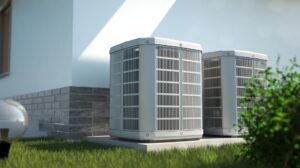The last thing you want to deal with during our overwhelmingly hot and humid summers is a broken-down air conditioner. There are things you can do to guard against unexpected breakdowns. You can change the air filter religiously every 1-3 months. You can schedule annual maintenance if you have a central air conditioner and twice a year if you have a heat pump. You can schedule a repair if your AC is making unusual noises.
However, even with the most vigilant attention to their air conditioners, Louisiana homeowners may face a breakdown despite this attention. That’s why it’s helpful to keep reading our blog so you can be aware of potential issues. One type of common breakdown that isn’t commonly known about is formicary corrosion. If you have an air conditioner with copper coils in the outdoor unit, this is a potential problem. Let’s discuss this issue so you’ll know if it’s going on with your AC.
What Is Formicary Corrosion?
Formicary corrosion is a type of corrosion that only occurs in copper. Depending on the make and model of your air conditioner, its outdoor unit (called the condenser) could have coils that are made of copper. Copper is susceptible to corrosion caused by a chemical reaction containing oxygen, water, and an organic acid. Some AC manufacturers have switched from using copper to all aluminum.
Unfortunately, this corrosion isn’t visible to the eye, which can make it harder to catch. If you were able to look at the surface of the condenser coils under a microscope, you’d see hundreds of tiny holes. This type of corrosion is unique because it occurs from the inside out so by the time these holes reach the outside of the coils, it’s too late.
What Causes Formicary Corrosion?
There are several causes. The most common is due to the chemical reaction we mentioned earlier. Your home has household cleaning supplies and these can release volatile organic compounds (VOCs) into the air. The VOCs enter your home’s air and then eventually make their way to your ductwork and the coils of your AC.
How Is Formicary Corrosion Addressed?
If it’s discovered that your AC condenser is suffering from formicary corrosion, it’s not an easy fix. However, there are a few options:
1. Apply a sealant to the coils.
2. Replace the coils.
3. Replace the air conditioning unit.
Obviously, these choices increase in cost with #1 being the cheapest fix. Although applying a sealant is an inexpensive option and might work, it’s often only a band-aid fix and you may soon find yourself with an AC that isn’t working again.
Depending on the extent of the corrosion, the technician might recommend #2 or #3 above. If your AC has to be replaced because of formicary corrosion, it’s best not to purchase a replacement unit that utilizes copper coils.
Professional Heating & Air is true to our name—professionals who do the best job for our clients and offer the finest in customer service. Learn why we stand out among AC repair contractors.
When you need it done right contact Professional Heating & Air.

